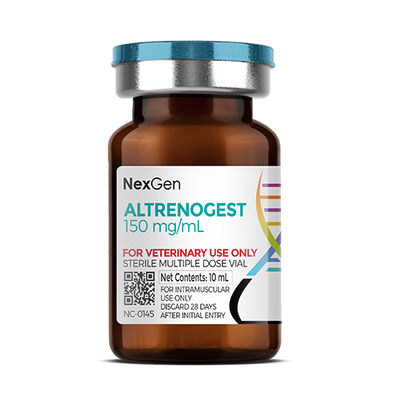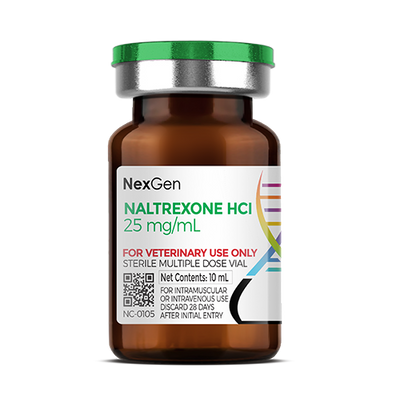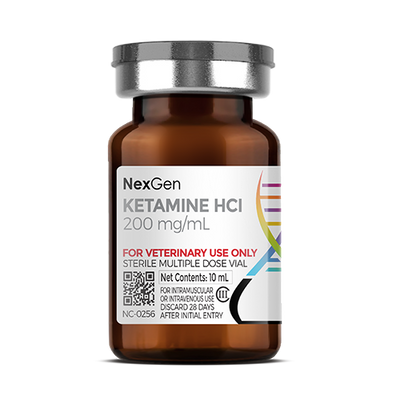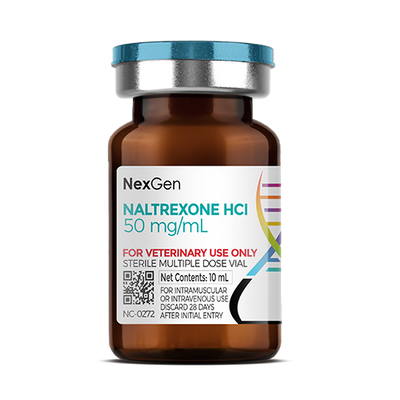
Adrenocorticotropic Hormone (ACTH) 80 IU, Injectable, (10mL)
Login for pricing
- Brand
- Mixlab
- SKU:
- NC-0029
- Product Type:
- Injectable
- Size:
- 10ml
- Administration:
- Intramuscular
- Therapeutic Class:
- Hormone
Adrenocorticotropic Hormone (ACTH) is a polypeptide tropic hormone produced by and secreted by the anterior pituitary gland. The hormone is an adrenal gland stimulant that is administered to secrete large amounts of cortisol into the bloodstream. In addition to steroidogenic enzymes, ACTH also enhances transcription of the mitochondrial genes that encode for subunits of mitochondrial oxidative phosphorylation systems. These actions may actually be necessary to supply the enhanced energy needs of adrenocortical cells stimulated by ACTH.
ACTH and Cushing’s Disease in Horses
Cushing’s Disease (also known as Equine Pituitary Pars Intermedia Dysfunction or PPID) is a condition involving the pituitary gland that usually affects that are 15 years of age or older. In Cushing’s, the pituitary gland becomes enlarged and produces too much ACTH. High levels of ACTH result in an over production of cortisol, which are secreted by the adrenal glands.1
Clinical signs of Cushing’s typically include incomplete shedding, long curly hair along the jaw or back of the fetlocks, abnormal sweating, increased water intake and urination, decreased energy and muscle loss. Horses with this disease have a lowered immune response, are more at-risk for infections and have a more difficult time clearing infections once they’ve set in.1 There is a link between horses with Cushing’s and insulin resistance, predisposing horses to laminitis and other health problems.
PPID in older horses is obviously a major health concern for horse owners; as a result, veterinarians and equine researchers have made vigorous efforts to understand, diagnose and treat this disorder. While PPID is recognized to be a different form of pituitary-dependent hyperadrenocorticism than is seen in canine or human patients, relatively little is known about the pathophysiology and natural progression of the disease.2 Presently, any diagnosis is best supported by clinical signs and endocrinologics tests.
When used for diagnostic purposes, it is unlikely that increases in serum cortisol levels induced by ACTH produce significant untoward effects on conditions where increased cortisol levels are contraindicated (such as systemic fungal infections, osteoporosis, peptic ulcer disease). Prolonged use of ACTH may result in fluid and electrolyte disturbances and other side effects.4 If using on a chronic basis, refer to the human literature for an extensive listing of potential adverse reactions.5
Where to buy Adrenocorticotropic Hormone
Adrenocorticotropic hormone (ACTH) is available in the U.S. through several pharmaceutical manufacturers and through veterinary custom compounding companies.
FOR RX ONLY: A valid prescription from a licensed veterinarian is required for dispensing this medication.
1McCue PM. Equine Cushing's disease. Vet Clin North Am Equine Pract. 2002 Dec;18(3) 533-43, viii. doi:10.1016/s0749-0739(02)00038-x. PMID: 12516933.
2Hatazoe, Takashi et al. Pituitary pars intermedia dysfunction (equine Cushing's disease) in a Thoroughbred stallion: a single report. Journal of equine science vol. 26,4 (2015): 125-8. doi:10.1294/jes.26.125.
3Schott HC. Pituitary pars intermedia dysfunction: equine Cushing's disease. Vet Clin North Am Equine Pract. 2002 Aug;18(2) 237-270. doi:10.1016/s0749-0739(02)00018-4. PMID: 15635907.
5Toribio R. The adrenal glands. In: Reed M, Bayly W, Sellon D, eds. Equine Internal Medicine 2nd Edition. Phila: Saunders; 2004:1357-1361.
6Berkovich R, Agius MA. Mechanisms of action of ACTH in the management of relapsing forms of multiple sclerosis. Ther Adv Neurol Disord. 2014;7(2):83-96. doi:10.1177/1756285613518599.
7Brunson KL, Avishai-Eliner S, Baram TZ. ACTH treatment of infantile spasms: mechanisms of its effects in modulation of neuronal excitability. Int Rev Neurobiol. 2002;49:185-97.




















